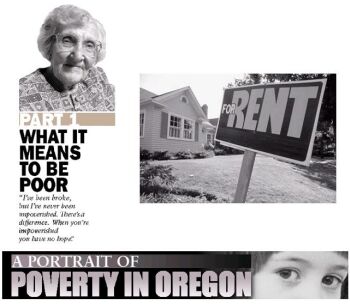
Publisher:
Bonnie King
CONTACT:
Newsroom@Salem-news.com
Advertising:
Adsales@Salem-news.com

~Truth~
~Justice~
~Peace~
TJP
Mar-28-2007 12:10

 TweetFollow @OregonNews
TweetFollow @OregonNews
Report: State Income Taxes Pushing Many Working-Poor Families Deeper Into Poverty
Salem-News.comAlabama, Hawaii, and Oregon will continue to impose some of the nation’s largest income taxes on the poor even after the expected reforms are implemented.
 |
(WASHINGTON, D.C.) - In nearly half of the states with an income tax, a family of four owes the tax even if its income falls below the poverty line, according to a new report from the Center on Budget and Policy Priorities.
In 19 of the 42 states that levy an income tax, the “tax threshold” (the income level at which families begin owing taxes) for a two-parent family of four for tax year 2006 is below $20,615, the poverty line for such a family.
The number of states that tax poor families of four was unchanged from 2005, as improvements in some states were offset by backsliding in others. (Since 1991, the number of states that tax poor families of four has declined from 24 to 19.)
But some improvements are expected in the near future, the report notes. Several states with very low tax thresholds have recently enacted changes that should save low-income families hundreds of dollars in taxes over the next three years.
“Families with very limited means are still taxed too much by states,” said Jason Levitis, the report’s author. “Progress is occurring slowly. States increasingly realize they shouldn’t be taxing people deeper into poverty.”
Among the report’s key findings:
1. As families file their 2006 income taxes this spring, families with poverty-level incomes face more than $200 in state income taxes in ten states: Alabama, Arkansas, Hawaii, Indiana, Iowa, Michigan, Montana, New Jersey, Oregon, and West Virginia. In four of these states (Alabama, Arkansas, Hawaii, and West Virginia), such families owe more than $400. These amounts can cause significant difficulties for families struggling to escape poverty, especially when combined with other taxes these families pay, such as sales, payroll, and excise taxes.
2. Among the states that made significant improvements for 2006 were Delaware, which implemented a state earned income tax credit that exempts working-poor families from the income tax; Virginia, which also implemented an EITC, raising its tax threshold by nearly $5,000; and Oregon, whose EITC is now “refundable” for the first time. (Under a refundable EITC, families whose EITC exceeds their income tax liability can receive a refund for the difference, which helps working families lift themselves out of poverty. Twenty-one states have EITCs, 17 of which are refundable.)
3. Among the states where low-income households’ tax bills rose significantly since 2005 were Georgia, Iowa, Mississippi, and North Carolina, all of which raised taxes on poor families by at least 25 percent.
4. In addition, New Jersey began taxing poor families of four for the first time since 1998; a family of four at the poverty line received a refund of $728 in 2005 but owed $219 in 2006.
In most states where low-income households’ tax bills rose, this happened not because of explicit policy changes but because tax provisions designed to protect low-income families — including standard deductions, personal exemptions, and credits — did not keep pace with inflation.
Nine states have recently enacted reforms that will reduce taxes on low-income families over the next several years: Alabama, Arkansas, Hawaii, Michigan, New Mexico, Oklahoma, Oregon, Utah, and West Virginia.
A number of these states, however, will continue to impose heavy income taxes on low-income families.
Alabama, Hawaii, and Oregon will continue to impose some of the nation’s largest income taxes on the poor even after the expected reforms are implemented.
Any state should be able to exempt the poor from income taxes, the report states.
The loss of revenue from such exemptions poses special challenges for states that have a large number of poor families, and also for states where the income tax is the major state revenue source, but these challenges can be overcome.
For example, the 27 states that exempt poor single-parent families of three from income taxes include three of the nation’s ten poorest states (Kentucky, New Mexico, and Oklahoma) and seven of the ten states that receive their largest share of state and local tax revenue from personal income taxes (Delaware, Kentucky, Maryland, Massachusetts, Minnesota, New York, and Virginia).
“By eliminating state income taxes on working families with incomes at or below the poverty line, states can offset some of the child care and transportation costs that families incur as they strive to become economically self-sufficient,” said Levitis. “In other words, by eliminating income taxes on poor working families, states can help make work pay.”
To see the report for Oregon click on this link: cbpp.org/states/3-27-07sfp-fact-or.pdf
Articles for March 27, 2007 | Articles for March 28, 2007 | Articles for March 29, 2007





Salem-News.com:
Terms of Service | Privacy Policy
All comments and messages are approved by people and self promotional links or unacceptable comments are denied.
Hank Ruark March 29, 2007 7:02 am (Pacific time)
To all: See Merkley-measure story above for solid approach underway on another badly-needed remedial action by this Legislature --perhaps waked up from confrontation by potent push-and-shove coming now from Oregon citizenry.
working poor March 28, 2007 5:40 pm (Pacific time)
we are a family of 5. our income comes from my husbands job- full time 16.00/hr- i get some extra money cleaning and doing things that i can do with my kids in tow. instead of paying for childcare i do it myself. we still paid 1400app in state taxes. thank god we got money back on federal. do i go on assistance to make it or pay lower taxes?
[Return to Top]©2025 Salem-News.com. All opinions expressed in this article are those of the author and do not necessarily reflect those of Salem-News.com.